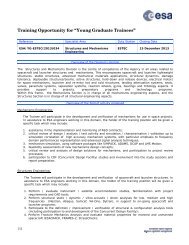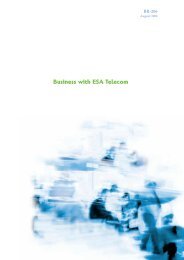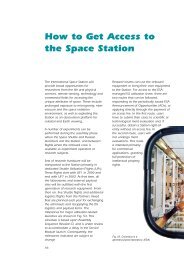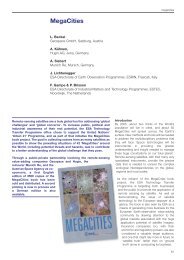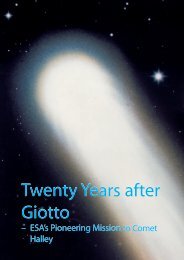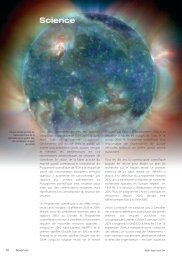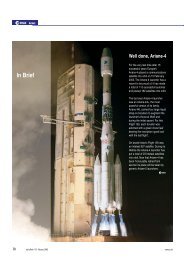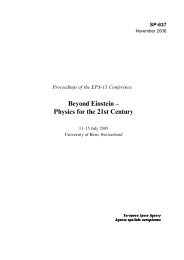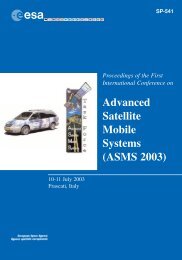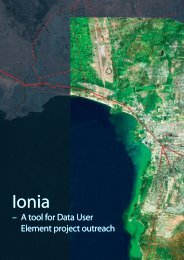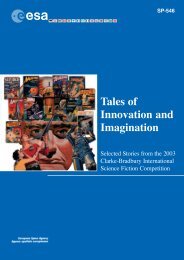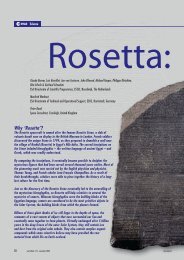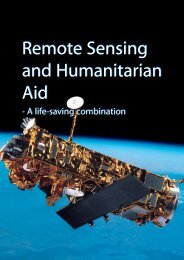The History of Sounding Rockets and Their Contribution to ... - ESA
The History of Sounding Rockets and Their Contribution to ... - ESA
The History of Sounding Rockets and Their Contribution to ... - ESA
Create successful ePaper yourself
Turn your PDF publications into a flip-book with our unique Google optimized e-Paper software.
1. Scope<br />
This report fi rst describes the his<strong>to</strong>ry <strong>of</strong> rocket development before <strong>and</strong> during the Second World<br />
War <strong>and</strong> their use as sounding rockets in Europe, the USA <strong>and</strong> the USSR, <strong>and</strong> then outlines the<br />
technical, operational <strong>and</strong> scientifi c features <strong>of</strong> sounding rockets. <strong>The</strong> major European national<br />
sounding-rocket activities <strong>and</strong> those <strong>of</strong> ESRO from the early 1960s <strong>to</strong> the early 1970s are then<br />
described, a period when sounding rockets represented an important part <strong>of</strong> space research. Over<br />
that time span, several hundred sounding rockets (up <strong>to</strong> 500 per year around 1970) were launched<br />
worldwide each year.<br />
This report does not present detailed scientifi c results obtained with the help <strong>of</strong> those soundingrocket<br />
fl ights, or detailed technical descriptions <strong>of</strong> the payloads or the sounding rockets themselves.<br />
Instead it gives a his<strong>to</strong>rical overview <strong>of</strong> the evolution <strong>of</strong> the use, benefi ts <strong>and</strong> importance<br />
<strong>of</strong> sounding rockets, which provided access <strong>to</strong> space for scientifi c experiments for the fi rst time.<br />
<strong>Sounding</strong> rockets also gave rise <strong>to</strong> the fi rst worldwide cooperation between scientists <strong>and</strong> spaceresearch<br />
institutes.<br />
During the 1960s <strong>to</strong> 1990s, sounding rockets provided inexpensive management schooling for<br />
space scientists active in several space research disciplines around the World. Those managers<br />
later became the key space scientists, when more sophisticated space research used complex<br />
satellites <strong>to</strong> study the Universe. <strong>Sounding</strong>-rocket activities had a similarly benefi cial effect on the<br />
creation <strong>of</strong> a space industry.<br />
When ESRO decided <strong>to</strong> concentrate from 1972 onwards on scientifi c <strong>and</strong> applications satellites,<br />
<strong>and</strong> on the development <strong>of</strong> the Ariane launcher <strong>and</strong> the Spacelab labora<strong>to</strong>ry, <strong>and</strong> <strong>to</strong> discontinue its<br />
own sounding-rocket programme, a second phase <strong>of</strong> European national sounding-rocket activities<br />
– devoted <strong>to</strong> space science – proceeded. However, the fi rst European national-level sounding-rocket<br />
programme, that <strong>of</strong> France, was terminated in the middle <strong>of</strong> the 1970s, whereas most<br />
<strong>of</strong> the other ESRO/<strong>ESA</strong> Member States continued their national fl ight activities. <strong>Sounding</strong>-rocket<br />
fl ights are still ongoing <strong>to</strong>day, but since the 1990s the content <strong>and</strong> scale <strong>of</strong> global activity in the<br />
space sciences has begun <strong>to</strong> shrink.<br />
In the second half <strong>of</strong> the 1970s, a new sounding-rocket user discipline emerged, namely the use<br />
<strong>of</strong> the free-fl ying phase <strong>of</strong> sounding-rocket fl ights for research in the materials <strong>and</strong> life sciences<br />
under microgravity conditions. This new mode <strong>of</strong> applications was used for short-duration microgravity<br />
experiments in fi elds such as fl uid physics, materials sciences <strong>and</strong> biology, as well as <strong>to</strong><br />
perform Spacelab <strong>and</strong> International Space Station (ISS) precursor experiments.<br />
1



